This short 5 day exploration is based upon the contents of my The Ego/ Eco Paradigm presentation, which is taken from my latest book entitled One World. The Ego/ Eco Paradigm offers a simple framework from which we can evaluate our impact upon the world. This framework helps us understand how we are driven by our values and beliefs, the impact that our values and beliefs have, and the consequences of our every day choices.
In this social messaging discussion, the following topics will be discussed.
Each section contains links that will help you explore the day's topic and our relationship with the world and explore what the Ego/ Eco Paradigm means to each individual.
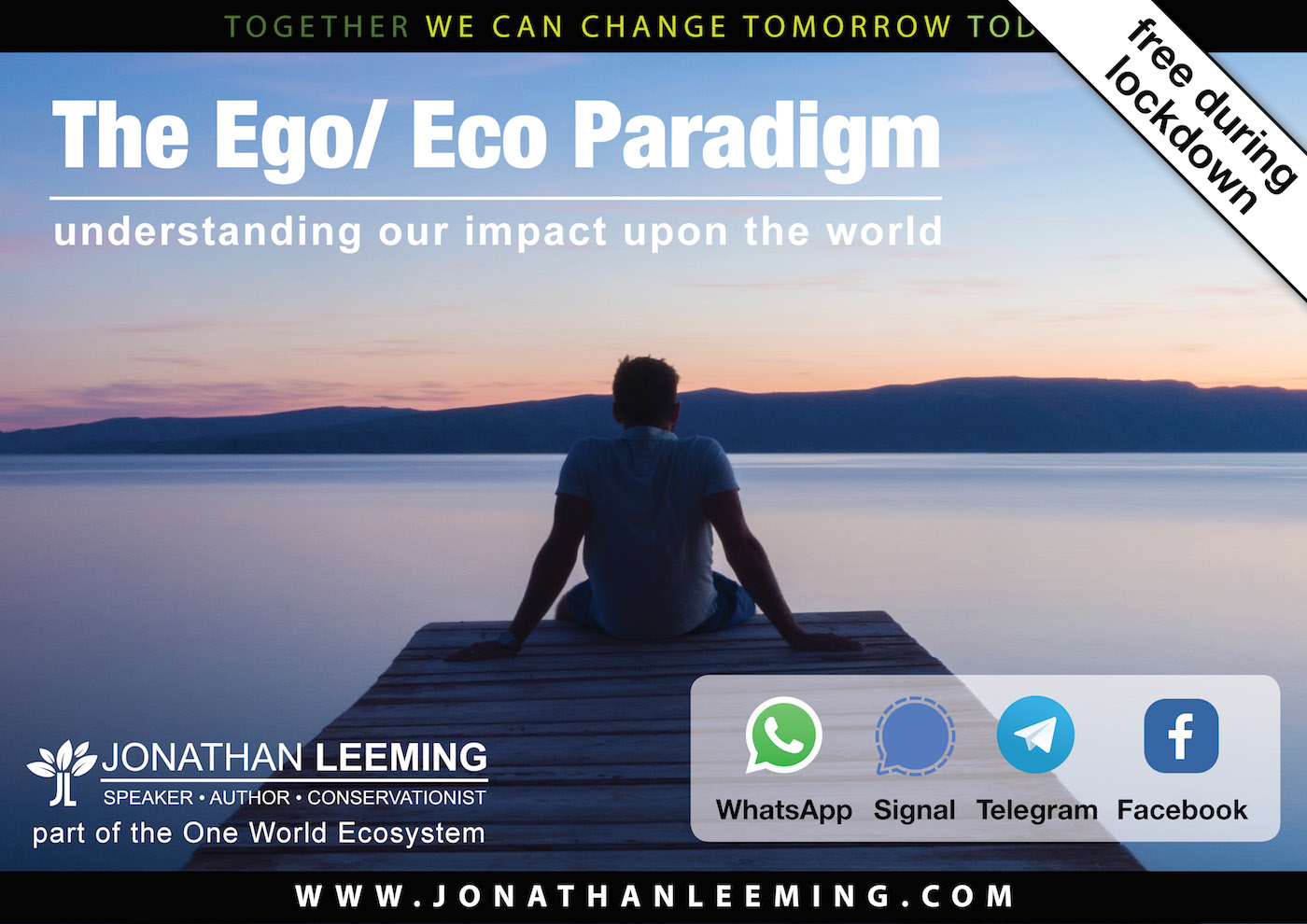
In the past 200 years, mankind has undone what nature has spent the past 3.85 billion years creating. It is a blink of an eye on the geological scale, but too slow for us to notice on a day by day basis. However, if your parents’ parents were alive, they would be disgusted by the destruction, pollution and utter contempt for the environment, that we find acceptable today.
Most people consider climate change, the waste crisis, the human health crisis, biodiversity loss and ocean degradation as environmental issues but they are not. Sustainability is not about saving the environment, it’s about saving ourselves who just so happen to rely upon the environment for our very existence.
The world is transformed by business activities. Taking a natural resource and turning it into products has been key in our economic development. We have all enjoyed prosperity, but for the natural environment and for society, the price of economic development has been very high.
Just as the consumption of junk food makes us physically sick, the consumption of junk values and believes has made us mentally sick. Many of us have given in to the myth of the modern lifestyle of consumption and waste, falling prey to a disconnect from the natural world.
Question How are people disconnected from the world.
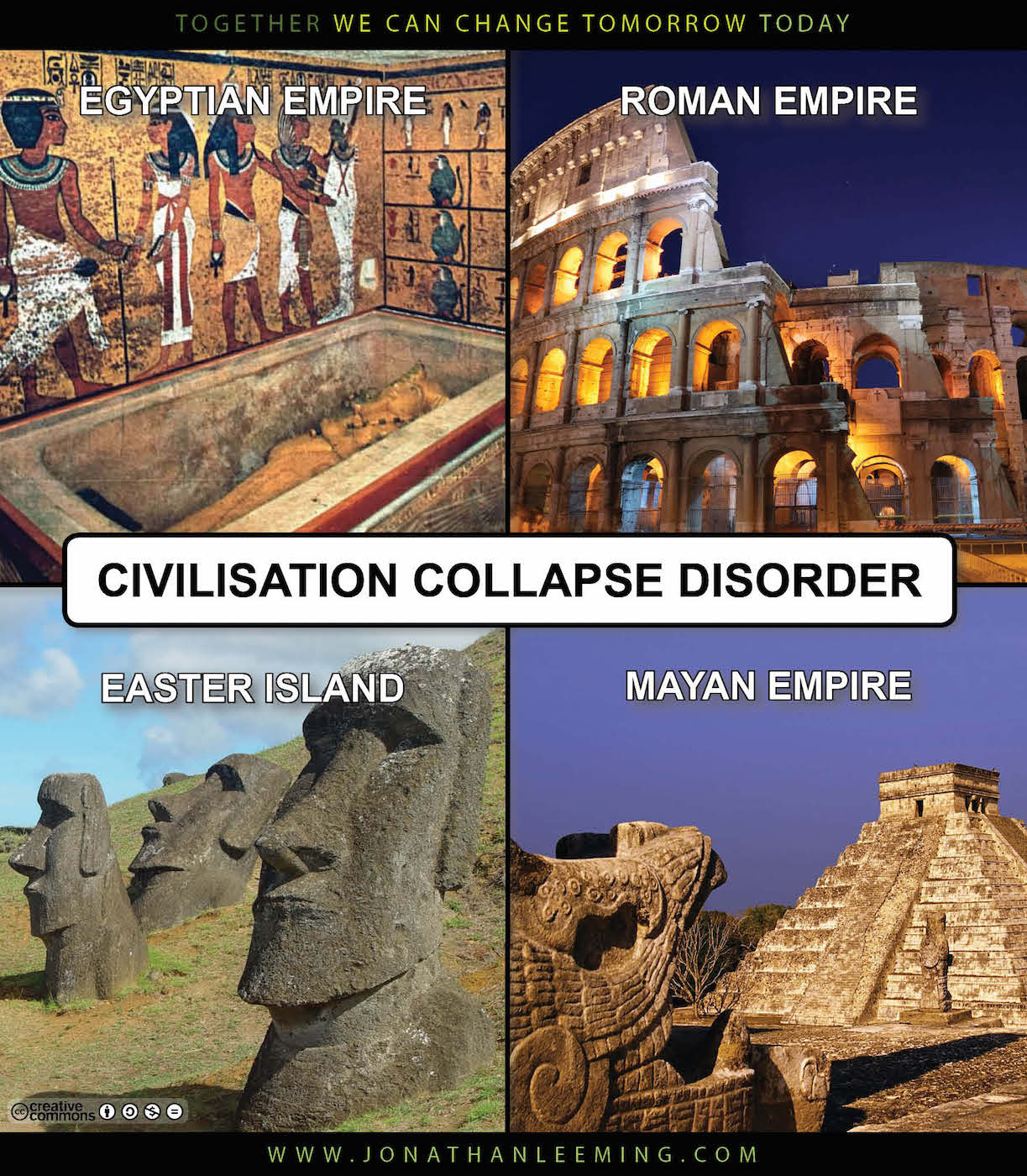
The human population has been increasing at an alarming rate. From 1804, it took just over 100 years for the human population to increase from 1 billion to 2 billion in 1927. By 2016, it was projected that we will increase our population by 1 billion in about 12 years.
Many feel that the world is already overcrowded, but consider that by 2050 there will be a projected 9.6 billion of us. Where will these additional people live and what will their impact be? A frightening question that our children will have to grapple with.
When other animal populations reach the upper end of their limits, a natural and controlling force steps in. Limited food, disease and self regulation keep populations in check. Humans however, have been blessed (or cursed) with the “intelligence” and aptitude to bend these limiting natural forces.
When we look at our collective impact on the world, we see that although population is an important factor, a more pressing issue is how we consume and the impact of this consumption. It may seem rational to think that the world’s problems can be solved if everyone consumed less, but we have to realize that people consume for different reasons. Consuming resources to prevent your family from starvation, is very different from consuming resources to manufacture a PlayStation 5.
Our lifestyles of consumption and waste, are destroying our world of tomorrow. But it does not have to be this way.
Question What lifestyle habits do we engage in that have a profound impact upon the world?
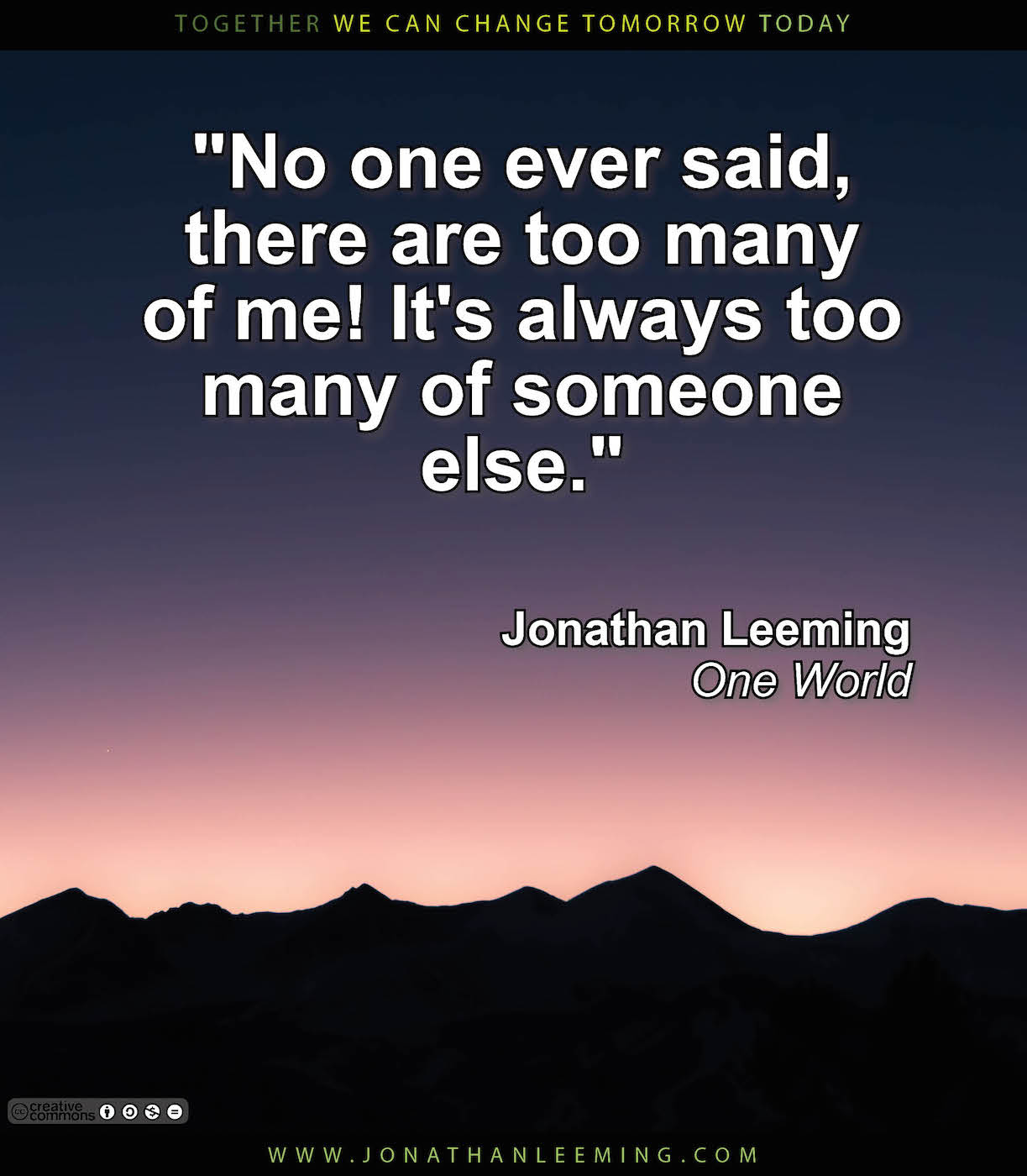
The Ego / Eco Paradigm is a framework that helps us understand how we interact with the world, and how to make those much needed incremental gains towards our personal vision of the future. According to the Ego / Eco Paradigm, we can divide our actions into two categories depending on the impact that they have.
Ego - Short term benefits to a minority, while incurring long term negative impacts to the majority. Although we may understand the negative consequences of ego decisions, we use short term economic benefits as a justification for our actions. Ego actions erode human health, create vulnerabilities in society and are the cause of the challenges that we face today. It is just not possible to continue with these actions indefinitely as they are unsustainable.
Eco - Long term benefits, characterised by a sustainable impact which can be absorbed, replenished or reversed through natural processes or human intervention. It must be understood that these actions do not conflict with economic development principles, but rather define an ethos that facilitates economic development in an honest and rejuvenating new way. Eco actions are the solutions to the challenges of our time as they are sustainable and can continue indefinitely.
Although we use our understanding and knowledge to make informed decisions, we don’t always make the right choice.
Question Give some examples of lifestyle impacts that are Ego and some that are Eco.
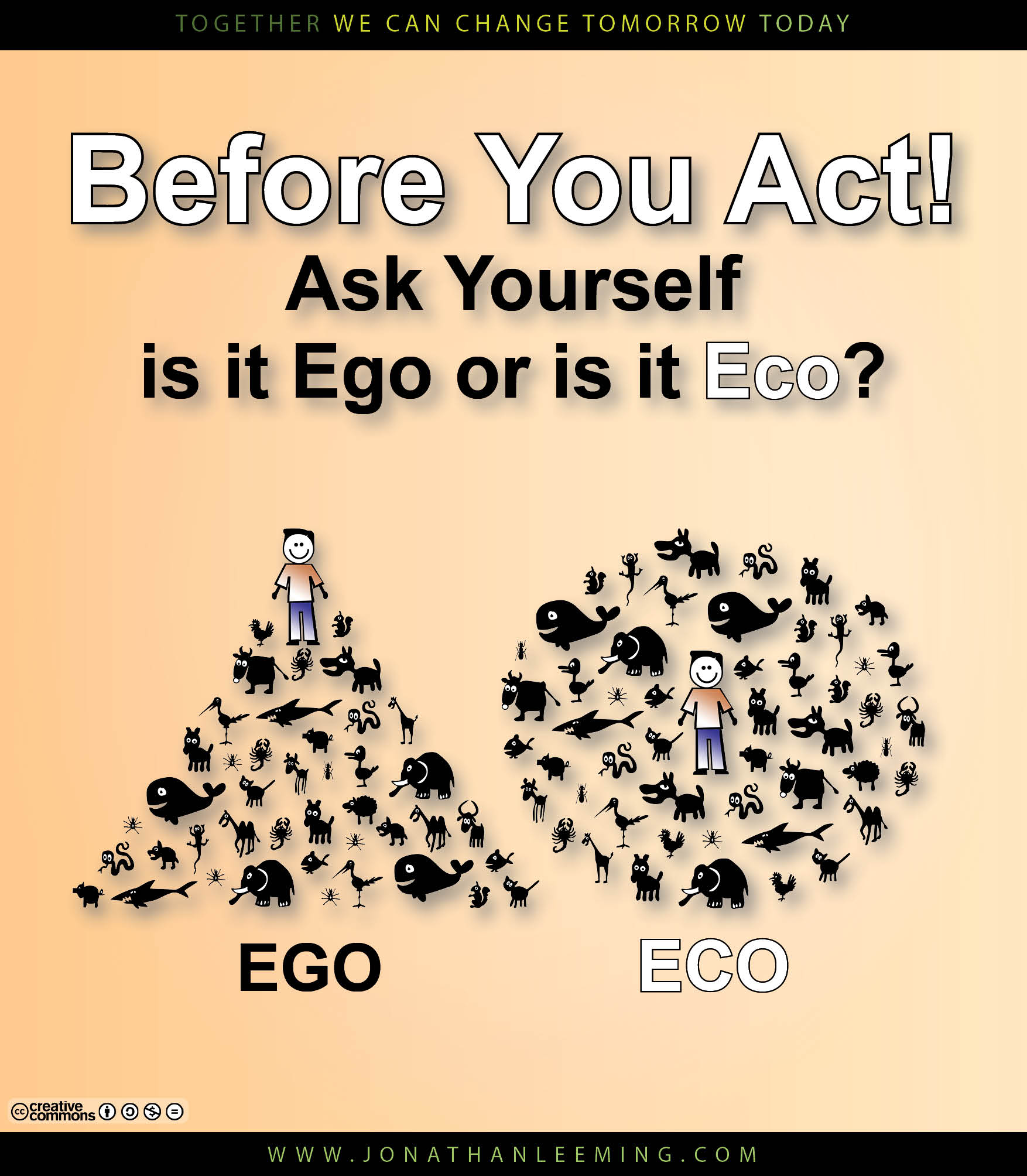
The question of how much do we impact upon the environment can be tricky to answer, simply because we are rarely aware of the consequences of our actions. So much of our impact is hidden from us either through society, or by the organisations who manufacture the products that we use.
The reality of our lives is that our impact is rarely pure ego or eco, but rather somewhere in between.
In light of the Ego / Eco paradigm, striving to be 100% sustainable is very difficult as it requires a great deal of consideration regarding the impact of the decisions that we make every day. If the impact regarding our choices was freely available, it would be easier to make the right decisions. However, this impact is intentionally hidden from us through greenwashing and dishonest marketing.
Question Name a product that is marketed as Eco, but in reality is Ego.
Imagine that you are driving your dream car down a dark and misty road. You could be driving anything from a Telsa, to a Hummer. All of a sudden, from the left a fluffy bunny rabbit jumps into the road, and from the right a snake slithers into the road. What do you do? If you swerve to avoid the rabbit, you’ll kill the snake! If you swerve to avoid the snake, you’ll kill the rabbit! If you do nothing at all, you’ll kill both of them!
The snake and the rabbit analogy illustrates the journey of your life and the decisions that you make everyday. Your dream car is the technology that you use, and how you drive it relates to how your values and beliefs influence how you consume.
In the snake and the rabbit analogy, sometimes we kill the snake, sometimes we kill the rabbit, and other times we just run everything over. However, there is another choice that we all need to be aware of. We should rather drive the car paying close attention to every obstacle that comes our way, taking corrective action or stopping to let the rabbit and the snake both cross the road.
We have to be aware that our everyday actions have the power to influence the world in a positive or in a negative way. Killing the snake or the rabbit, or both, is a choice. A choice that we each have to make.
Question What 3 things can you change in your life to reduce your impact on the world?
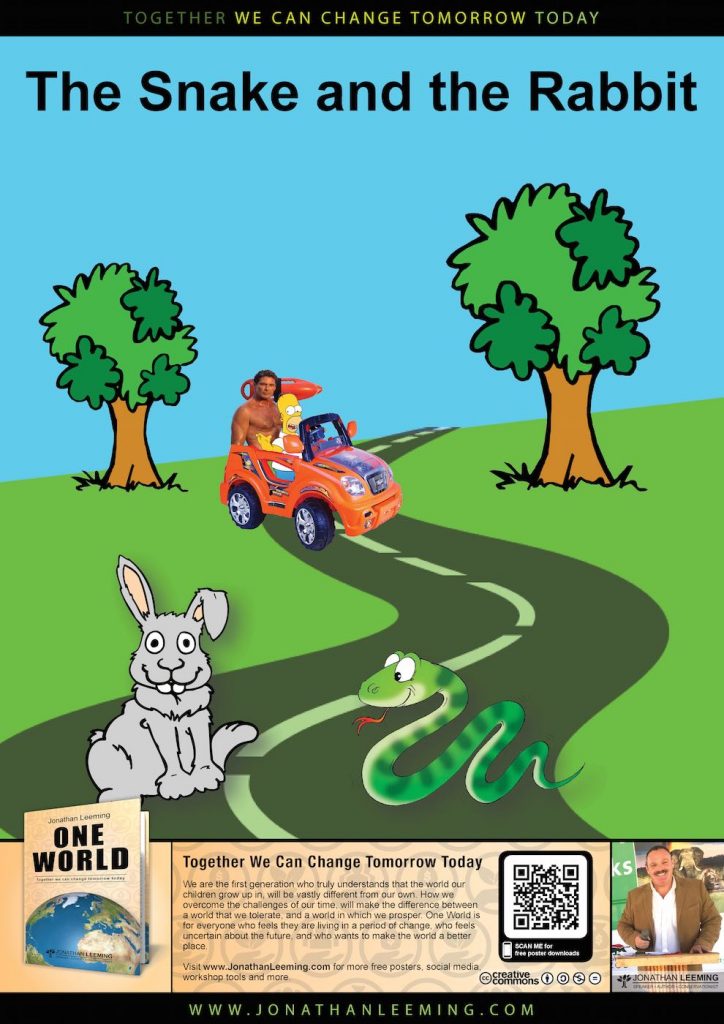
Lockdown has been a tough time for many of us. There is one reality that we have to face. The world will never be the same as it was before 2020.
How we experienced this time, and how we reacted, should represent a learning curve that we must leverage in order to recalibrate our daily lives and prepare ourselves for the future. There will be another pandemic, and if we do not learn from this experience, we are destined to relive the same mistakes and failures, again and again and again. Being locked up in our homes has provided a moment of pause for our nagging internal narrative, and awakened the opportunity to stop and re-imagine who we are, and the future of who we aspire to be.
We all need help in our own unique way. While you are waiting for someone to be your blessing, you can be someone else’s blessing. So give what you can, and take what you need.
If you found the content of interest then you will love my latest, award winning book entitled One World.
Jonathan Leeming
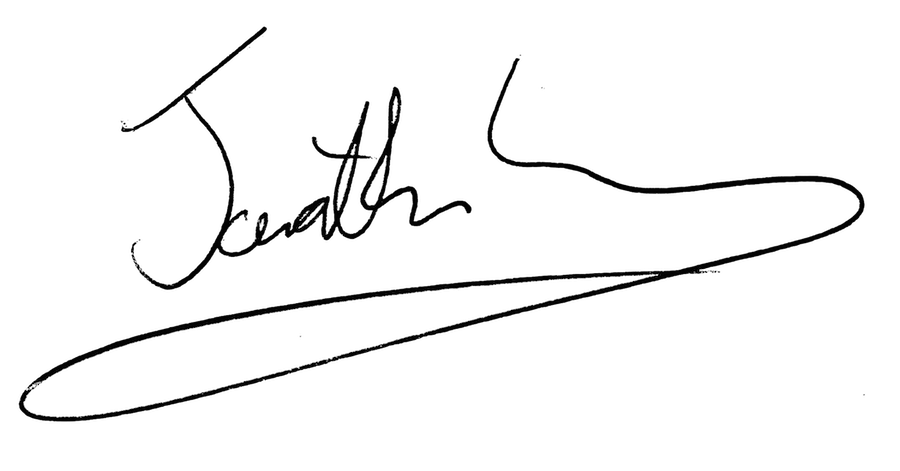
Jonathan Leeming is author of 9 books (Scorpions of southern Africa, Scorpions of Sabi Sands, Spider & Scorpion Risk Assessment, Venomous Animal General Awareness, Risk Assessment & First Aid, Antivenom Management, General Awareness, First Aid Guide To Spider Bites & Scorpion Stings).
He consults for the Poison Information Helpline. Steve Biko Academic Hospital. Swaziland Antivenom Foundation, and various other organisations, and speaks at medical conferences on the subject of envenomation. Best selling author, professional speaker and conservationist, Jonathan brings a fresh and unique insight into the subject of venomous animals and their bites and stings.
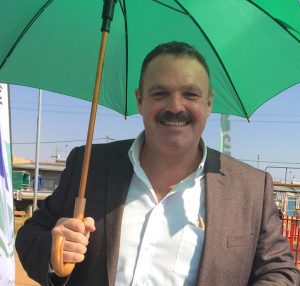

Hi Jonathan
Great chatting to you and thanks for the green light to quote your story - The snake & rabbit.
Regard
Eugene
Hi Eugene, thank you for asking me for permission to republish my Snake and the rabbit analogy. It is an important message that needs to get out into the world.
Jonathan
Your messages on our WhatsApp group made me stop and think about how I impact the world. I shared your messages to my homeschool group which sparked a discussion. Your message is so important, I hope that it spreads far and wide.
Hi Marie
The aim of these short posts is to make people stop and think about their relationship with the world. I'm pleased that you could relate to the content and find value in it. You will find more free resources on this website. You are welcome to share them. I also have an online workshop tool related to the contents of this social discussion. I will forward you a link.
Together we can change tomorrow today
Jonathan